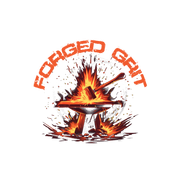Sugar Isn't Cocaine. It's Worse: It Pretends to Love You

Let’s talk about addiction — the everyday kind we pretend isn’t real.
Somewhere along the way, sugar went from being a rare survival tool to a daily companion. We dress it up in cupcakes, celebrate it on holidays, reward kids with it, and binge it when life feels too heavy. But make no mistake: sugar isn’t just a “treat.” It’s a normalized, legal, behavioral drug — and one that hijacks your brain in ways far more subtle (and sinister) than you may think.
You’ve heard the phrase: “Sugar is as addictive as cocaine.” It’s bold, alarming… and not quite accurate.
Here’s the uncomfortable truth: sugar is more like sex. And that’s exactly what makes it so dangerous.
Watch our video on this here: https://youtu.be/Hy23pl4tMC4
The Sweet Lie: Why Sugar Feels So Good
Let’s get one thing straight: sugar isn’t a nutrient. It’s a molecule that exists to provide two things—sweetness and calories. Thousands of years ago, stumbling upon sugar in the wild meant survival. It was rare, and your brain rewarded you for finding it. Fast-forward to today, and we’re surrounded by it 24/7—triggering ancient reward circuits that were never designed for this world.
So what actually happens when you eat sugar?
In seconds, it lights up your brain’s reward system—formally called the mesolimbic dopamine pathway. This system includes the nucleus accumbens, a key player in pleasure and motivation. Sugar hits it hard, causing dopamine to surge.
If that sounds familiar, it should: it’s the same thing that happens during sex.
That rush you get from a donut? Neurologically, it’s eerily close to orgasm. Not to ruin dessert forever, but it’s worth knowing what’s going on under the hood. Both sugar and sex activate powerful reward mechanisms. They feel good because they were designed to reinforce survival behavior. Food gives you energy. Sex gives you reproduction. But neither was ever meant to be on-demand.
And today? DoorDash delivers both.
Cocaine vs. Cupcakes: The Wrong Comparison
Cocaine is what scientists call a pharmacological superstimulus. It floods your system with dopamine—300–400% above baseline—then drops you into a pit of withdrawal. The cycle is extreme, damaging, and ultimately hijacks your brain’s ability to regulate pleasure.
Sugar, on the other hand, gives you a 150–200% dopamine boost—similar to sex, gaming, or getting likes on Instagram. It’s not chemically destructive like cocaine, but it still rewires your brain’s reward system over time.
Let’s be clear: You’re not going to sell your furniture for a bag of Skittles. But if you’ve ever told yourself, “Just one cookie,” and ended up elbow-deep in the box, you know exactly how powerful sugar’s pull can be.
But Wait, Didn’t Rats Choose Sugar Over Cocaine?
Yes—and no. In a famous study, rats were given a choice between sugar water and cocaine. Most chose sugar. Headlines screamed: “Sugar is more addictive than cocaine!”
But the reality was more nuanced. These rats were deprived of food, isolated in cages, and had never experienced sweeteners before. Under extreme conditions, sugar became the more attractive option—not because it was chemically stronger, but because it triggered natural reward mechanisms their environment lacked.
In other words: the study proved that sugar can feel more comforting than cocaine when you’re deprived of everything else. That’s not addiction—it’s desperation.
Behavioral Addiction: The Real Danger
Sugar doesn’t cause chemical withdrawal like cocaine. But it does cause compulsive behavior—just like sex, porn, video games, and social media. These are all behavioral addictions: habits that flood your brain with dopamine, but don’t deliver meaning or long-term reward.
Chronic sugar use slowly raises your dopamine threshold. The things that used to bring joy—coffee, music, sunsets—feel flat. You need a bigger hit just to feel normal. And when you try to stop? Mood swings, irritability, mental fog. Not because your body is chemically dependent—but because your brain forgot how to feel good without the shortcut.
That’s exactly how sex addiction works too. The addiction isn’t to the act—it’s to the feeling. The escape. The comfort. The illusion of control.
The Illusion of Innocence
Unlike sex, which we regulate, moralize, and build entire cultural systems around, sugar is handed out like it’s harmless. Every holiday in America? A different shape of sugar: hearts in February, eggs in April, pumpkins in October. We give sugar to kids for being brave, adults for being sad, and everyone for existing.
We train ourselves to associate sugar with comfort, connection, and reward—starting in childhood. And when a behavior becomes that deeply woven into emotional regulation? That’s addiction territory.
So What Do We Do About It?
You don’t need to become a monk living on kale and regret. But you do need to respect what sugar does to your brain.
Here’s a simple rule of thumb: Don’t eat sugar until after your hardest effort of the day. Whether it’s a workout, a deep work session, or a tough conversation—make sugar the reward, not the escape. That trains your brain to link dopamine to effort, not avoidance.
Because that’s the real solution here. It’s not about quitting sugar forever. It’s about earning your pleasure, not numbing your pain.
The Bottom Line
Sugar isn’t cocaine. But it’s seductive. It’s sneaky. It whispers, “You deserve this,” when you haven’t done a damn thing.
It promises love. Comfort. Control. And that’s exactly what makes it so dangerous.
So use it like you’d use sex: mindfully, occasionally, intentionally. Not because you're bored. Not because you're stressed. And definitely not because it's just there.
Because when you respect the power of reward—you reclaim the power of choice.


Leave a comment